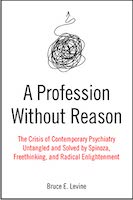Behind Rolling Stone’s Hatchet Job on a Psychiatrist Critical of Neoliberal Capitalism
Welcome to the Twilight Zone of the political landscape of psychiatry, where faux-left liberals are clueless that they have unwittingly become right-wingers, where shameless right-wingers exploit anything in an attempt to hold on to their AR-15s, and where anti-authoritarian left critical thinkers know that if they are not careful—or even if they are—they will find […]
Psychiatry’s Failure Crisis: Are You Moderately or Radically Enlightened?
Psychiatry has historically promoted dogma—not science—and dogma tends to be boring for freethinkers who can smell its odor even before they can deconstruct it. The challenge then is this: How can psychiatry be examined in a novel way that might intrigue freethinkers and critical thinkers of science, philosophy, politics, and history who would not ordinarily […]
Psychiatry’s Failure Crisis: Are You Moderately or Radically Enlightened?
Psychiatry has historically promoted dogma—not science—and dogma tends to be boring for freethinkers who can smell its odor even before they can deconstruct it. The challenge then is this: How can psychiatry be examined in a novel way that might intrigue freethinkers and critical thinkers of science, philosophy, politics, and history who would not ordinarily […]
Marx, Spinoza, and the Political Implications of Contemporary Psychiatry
Simple logic tells us that those atop a societal hierarchy will provide rewards for professionals—be they clergy or psychiatrists—who promote an ideology that maintains the status quo, and that the ruling class will do everything possible to manipulate the public to believe that the social-economic-political status quo is natural. If a population believes that its […]
Marx, Spinoza, and the Political Implications of Contemporary Psychiatry
Simple logic tells us that those atop a societal hierarchy will provide rewards for professionals—be they clergy or psychiatrists—who promote an ideology that maintains the status quo, and that the ruling class will do everything possible to manipulate the public to believe that the social-economic-political status quo is natural. If a population believes that its […]
Coffee With Comrades: Episode 167: “Care without Fear” ft. Bruce E. Levine
Psychiatry’s Medical Model: How It Traumatizes, Retraumatizes & Perverts Healing
Before describing how psychiatry’s medical model traumatizes and retraumatizes—both overtly and insidiously—and before distinguishing genuine healing from psychiatry’s perversion of this term, I will begin by tackling the following question: What Exactly is Psychiatry’s “Medical Model?” Psychiatry’s medical model is essentially a disease model. While there are controversies about its definition—which I will return to—in […]
Psychiatry’s Medical Model: How It Traumatizes, Retraumatizes & Perverts Healing
Before describing how psychiatry’s medical model traumatizes and retraumatizes—both overtly and insidiously—and before distinguishing genuine healing from psychiatry’s perversion of this term, I will begin by tackling the following question: What Exactly is Psychiatry’s “Medical Model?” Psychiatry’s medical model is essentially a disease model. While there are controversies about its definition—which I will return to—in […]
Talk World Radio: Bruce Levine on Psychiatry and Spinoza
Do You Still Believe in the “Chemical Imbalance Theory of Mental Illness”?
It continues to come as a great surprise for many people to learn that psychiatry’s leading authorities, including the former longtime director of the National Institute of Mental Health (NIMH), have discarded the “chemical imbalance theory of mental illness”—an idea which has had a profound impact on millions of emotionally suffering people and on our […]




